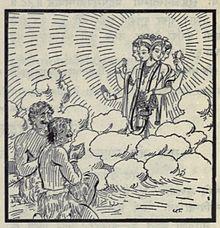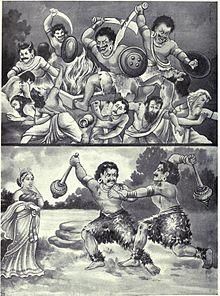| Sunda | |
|---|---|
 Brahma give boon to Sundopasunda |
Mythological characters from the great epic Mahabharata, Sunda (सुन्द) and Upasunda (उपसुन्द) were Asura princes and brothers. Their father was Jambha. The brothers grew up to be very powerful and were always of one mind. Together, they embarked on a campaign of world domination that began with a program of extreme asceticism in the mountains. Their asceticism generated such extreme heat that the gods themselves became exceedingly alarmed. Unsuccessfully, the gods attempted to distract the brothers through the enticement of maidens and by means of disturbing illusions of rampaging Rakshasas. Finally, Brahma agreed to grant the brothers a boon, on condition that they desist from their asceticism. The brothers agreed to the condition, and received the boon of being completely invulnerable, except that they could be killed by each other. Leaving the mountains, Sunda and Upasunda returned home, mustered an army, and proceeded to conquer and to devastate the entire world. They even drove the gods from their celestial abode. Finally, Brahma was again moved to action. He created the beautiful apsara Tilottama and ordered her to cause dissent between the brothers. Tilottama found Sunda and Upasunda in the countryside with their retinue, drinking and celebrating their victories. Beholding Tilottama, they immediately fell to fighting over her, and ended up killing each other. Thus was the world order reestablished.
References
- The story of Sunda and Upasunda is found in the Mahabharata, Book I: Adi Parva, Sections 211 ff. An online version of the Mahabharata in English translation is available at sacred-texts.com.
